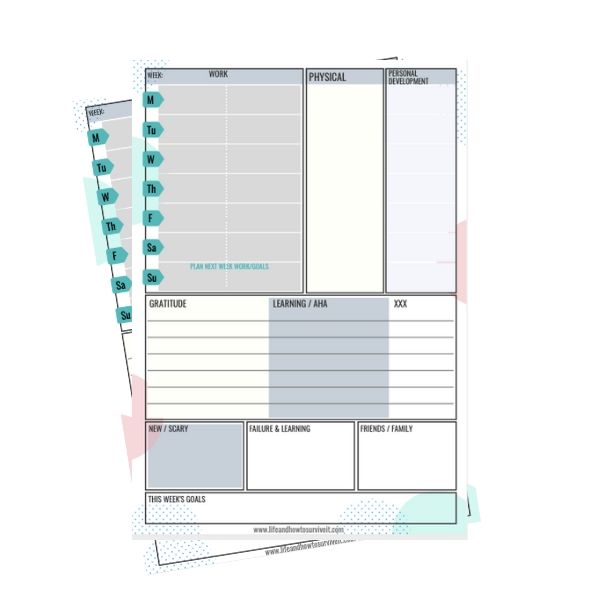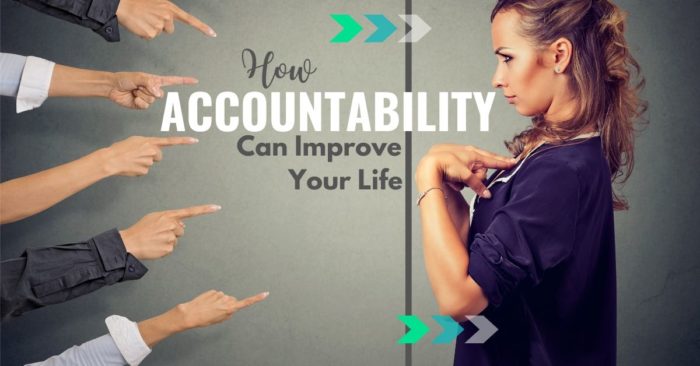Are you happy being a mere spectator of your own life? If so, great: as you were. But for those of us who want to get the most we can out of life, accountability is an essential tool for change and growth. Without it, reaching our goals would be far more difficult.
Accountability Vs Responsibility
Many people confuse accountability with responsibility, so let’s start out by clearing that up. This definition is pretty helpful (Dict):
The main difference between responsibility and accountability is that responsibility can be shared while accountability cannot.
Being accountable not only means being responsible for something but also ultimately being answerable for your actions.
Accountability begins, and ends, with YOU. Any failures or successes are yours, own them. Take responsibility for them. Be compassionate with yourself and learn from the failures – enjoy the wins and tell yourself, “I did this”.
Not all of us find it easy to be self-accountable. Thankfully though, it’s a skill we can learn.
Self-discipline
Without discipline, it’s hard to get anything done. Some of us are good at self-discipline, but for those who are not, accountability can be a tough nut to crack. If we are disciplined, we are more likely to work towards our goals, keep our word and hold up our end up of agreements.
The self-disciplined super-heroes amongst us have the skills to do this on their own. They see the need for change and make the necessary adjustments in their lives to achieve it. They have no need to depend on others to help them be accountable. Their productivity is high and they stay on track.

How Can I Be More Accountable?
However, if your self-discipline is poor, you might struggle to be accountable. It’s a fact that many of us are far more likely to do something when we’ve publicly committed to it with someone else. For example, if you book a personal trainer at the gym, you’re more likely to go, knowing that there is someone there waiting for you. It’s much harder to talk yourself out of going and just cancel it.
When things don’t turn out as you’d hoped, what are you most likely to do? Do you look for something or someone else to blame it on, or do you examine your own thinking and actions that led to where you are now?
What Stops Me Being Accountable?
If you ever find yourself complaining about a situation, you are essentially painting yourself as the victim. You might not realise it, but by not taking ownership of a situation, by blaming others, you are not taking responsibility for the decisions you made, that got you to where you are now.
Let me give you a very painful example from my own life. Once upon a time I had enough income from renting out the properties that I owned to not have to work. I then got married to an entrepreneur and invested in a business idea he had, financing it with my properties. The business not only failed, it gobbled up my entire investment.
I lost everything. For a long time, all I did was complain about how I’d lost everything as a result of the business failing. I was stuck in a negative spiral and couldn’t see a way out. Although I never actually said to him “It’s your fault, your business decisions led to this”, I certainly thought that for a long time.
Nowadays, I don’t see the situation that way at all. After a lot of personal development work, I understand that I chose to invest my properties in the business. Instead of saying ‘no’ to him and intervening when I saw him make decisions that I didn’t agree with, I chose to leave him handling everything. It was my failure, I have to own that.
Why Accountability Is Important In Life
I was so busy blaming everything else in my situation and wishing it would change, that I had failed to see that the only thing I could change was myself. Instead of sitting back and railing against the world, I needed to examine what I had done, or not; what I was responsible for and how my attitude was holding me back.
Holding myself accountable for my situation stopped me seeing myself as a victim of my circumstances. There was so much power in that painful realisation. I had lost so much, yes, but I could now see why. That allowed me to start to move forward. I was no longer trapped in my complaints and self-pity.
Instead of blaming others for the failures, I accepted responsibility for them, for the decisions I had made, or not made, that led to this. I held myself accountable.
The Fear of Failure
Failure is always uncomfortable: after all, very little growth takes place from the comfort of our armchairs. If we allow the fear of failure to keep us curled up cosily in that armchair, instead of stepping out into the world and picking ourselves up after a fall, we will never learn. We will never grow.
This pivotal awakening meant that instead of pouring all my energy and rage into feeling sorry for myself, I dedicated it to improving myself. Bit by bit I came to see how my thinking had been holding me back. The desire to not take responsibility for the massive mess all around me meant that I was not holding myself accountable at all.
So, how has accountability changed things for me?
Oh, in so many ways…
As someone who owns their actions, it is much easier to commit to the serious work of making things happen. How can you expect to do that when it’s always someone else’s fault? I defined goals for myself, including action plans for how to achieve them.

How Can I Reach My Goals?
Having experienced colossal failure already, I considered alternative paths to reach my new goals. When I came across complications and obstacles, I tried to learn from them and I adjusted my actions accordingly.
I didn’t just give up each time it seemed hard (which was seriously every single day for many months). Instead, I persisted. I was committed to change – my change.
New learning gave me new tools: I started to re-read some of the course books from when I had trained as an art psychotherapist, and I began listening to podcasts on personal development. I saw how I had allowed myself to sit back and let someone else take the reins of my life: I had chosen lazy comfort over awakened hard work.
Accountability And Habit Tracking
One of the key ways I began to become more accountable was to keep a journal. At first I started a journal to track my habits, and tracking your habits is an excellent way to help keep yourself accountable. I began with a simple daily habit tracker but soon realised I needed to adjust it to MY life. I ditched elements that didn’t work for me and added others that I discovered along the way.
For example, as well as tracking my daily work, exercise, personal development, gratitude and learning, my journal now includes my goals for the week, what I did that was new or scary and what I failed at and the learning related to that failure.
In addition, it includes a friends and family section: I find that these days I am so driven and hard-working that if I’m not careful, I forget to touch base with people. Even a quick message to a loved one is enough to let someone know I’m thinking about them. Before I had this section, I would say to myself “oh I’ll ring so-and-so later…” but then I’d never get around to it.

An Accountability Journal
So what began as a simple habit tracker has become the most useful tool I have for self-accountability and personal development. Once I learned how to fully incorporate this into my life, everything changed.
I’ve been using the same format for months now and I LOVE it. It’s very rare that I don’t complete it daily. In fact, it’s happened only twice: once on holiday and once when a friend came to stay for my birthday weekend.
How To Use An Accountability Journal
At the end of each week I quickly tot up how I’ve done, eg exercise every day, goals completed or not etc, and this helps keep me on track. Without tracking – and measuring – our activities, intentions and goals, it is harder to be accountable to ourselves.
I do an overall summary at the end of each month, and use that information to inform my goal setting for the new month. I try to see how I can improve in the areas where I didn’t meet my targets.
Make Your Own Accountability Journal
There are some lovely journals out there, and you may find one that fits you perfectly. If that isn’t the case though, I would urge you to make your own – the more personal to you and your needs it is, the more useful a tool it will be to you.
You are welcome to download a copy of my weekly journal and use it as it is, if you think it would suit your needs. I’ve also included a version with some empty title spaces so you can complete them according to what works best for you (complete your name and email below to get them).

If you have the time, and would like to make your own, it’s really easy to use a free online service like canva.com to design it. That way, as you grow and develop and understand your tracking needs, you can adjust the tracker accordingly. I’m now on my 4th version in a year.
Accountability, Like A Puppy, Is For Life
Once you find the correct structure for your own daily journal, accountability becomes so much easier.
Accountability is not a one-time thing. Yes, you might feel the need for increased accountability for certain projects, or certain phases in life, but if we wish to continue to grow as productive and developing beings, then threading accountability into our normal daily life is essential.
An Accountability Partner
However, if you are reading this and thinking “yeah, yeah, I’d love to be more accountable but I know I’ll not bother to fill out the journal every day…” then perhaps having an accountability partner would help you. Look out for next week’s post to read more about what an accountability partner is, what you could get out of it and how to find one.
Conclusion: Why You Need Accountability
Accountability is an essential tool for effective growth, meeting targets and being in control of our lives.
It means we take responsibility for our actions and decisions, AND we are answerable for them. By doing so, we stop blaming others for what happens in our own life, and take back control to make necessary changes. We can easily measure our progress by using a journal.
How do you approach accountability in your life? Do you use a journal, and measure your success?

